When it comes to concealed carry, many people might wonder if a holster is truly necessary.
Is tucking your handgun into a waistband or slipping it into a pocket enough?
While these options may seem budget-friendly and convenient, they carry an array of risks—from unintentional discharge to legal repercussions.
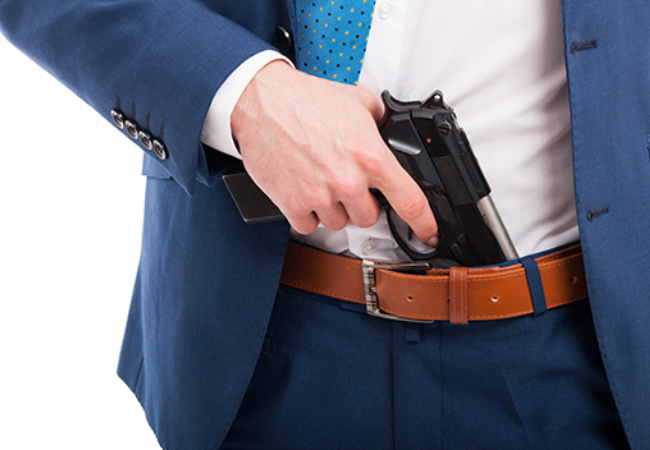
This article aims to examine the legislation surrounding concealed carry in states like Texas and Kansas, explore the role of various carrying options such as fanny packs and bags, and discuss the hazards associated with ignoring trigger guards or proper belt support.
We’ll also consider the angle of the gun barrel, the safety of pedestrians, and the importance of money spent on a proper handgun holster.
Whether you carry a pistol, a firearm, or another type of weapon, understanding the law and the risks is crucial for responsible concealed carry.
Can You Conceal Carry a Firearm Without A Holster?
Certainly, While it may be physically possible to conceal carry a firearm without a holster, doing so is generally not advisable for a variety of reasons.
First, laws surrounding concealed carry vary by jurisdiction.
Some states or localities may not explicitly require a holster but could have other restrictions or conditions that make carrying without one risky from a legal standpoint.
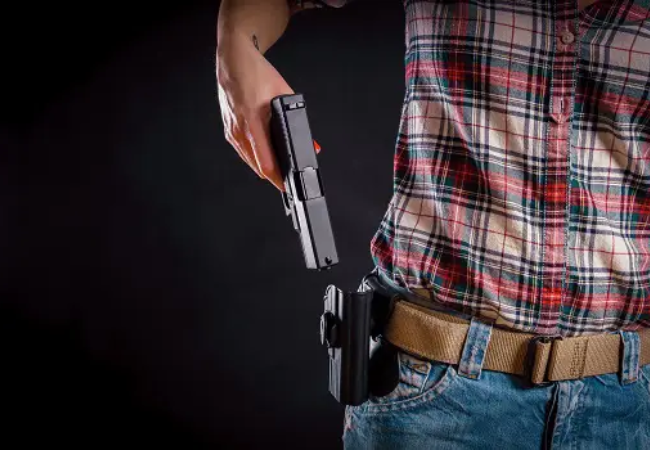
Second, there are significant safety concerns associated with carrying a firearm without a holster.
A holster is specifically designed to protect the trigger and securely hold the firearm, reducing the likelihood of unintentional discharge.
Carrying a gun loosely in a pocket or waistband can lead to accidental trigger engagement, posing a risk to both the individual and others.
Lastly, while forgoing a holster might seem like a cost-saving measure, the potential legal and medical expenses resulting from an accident could be much higher.
Therefore, while you might technically be able to carry without a holster, the risks often outweigh the benefits.
Legal Aspects of Concealed Carry Without a Holster
Before diving into the different carrying options, let’s first explore the legal aspects surrounding the issue of carrying a firearm without a holster.
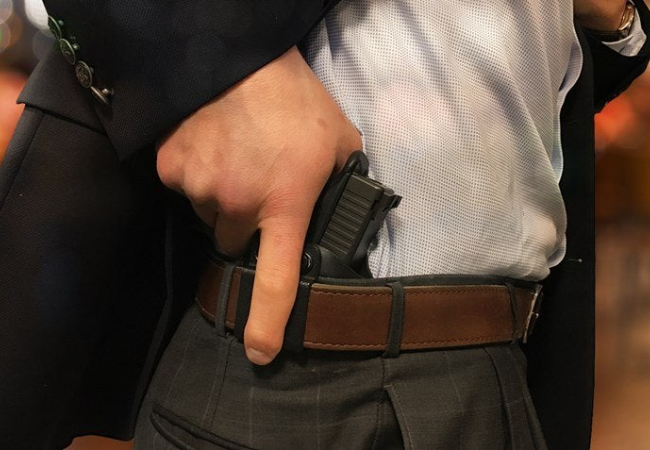
Legislation in Different States
In the United States, concealed carry laws are largely determined by individual states. For instance, Texas has its jurisdiction regarding what constitutes lawful concealed carry, while Kansas has its own set of rules.
Both states, however, emphasize the importance of safety and proper training. The lack of a holster can sometimes be interpreted by law enforcement as reckless behavior, thereby complicating your legal standing in the event of an incident.
So even if your state’s legislation doesn’t explicitly require a holster, carrying without one may still lead to legal complications.
Federal Law on Concealed Carry
Federal law provides a framework but leaves much of the specifics to state jurisdictions. The law of the United States generally does not require a holster for concealed carry, but it does enforce restrictions on where a firearm can be carried, such as federal buildings and schools.
A holster can affect how law enforcement views your intent and responsibility. Therefore, even if not explicitly stated, federal law indirectly encourages the use of holsters for safer and more responsible concealed carry.
Safety Concerns
Understanding the safety concerns related to carrying a handgun without a holster is crucial for anyone considering this option.
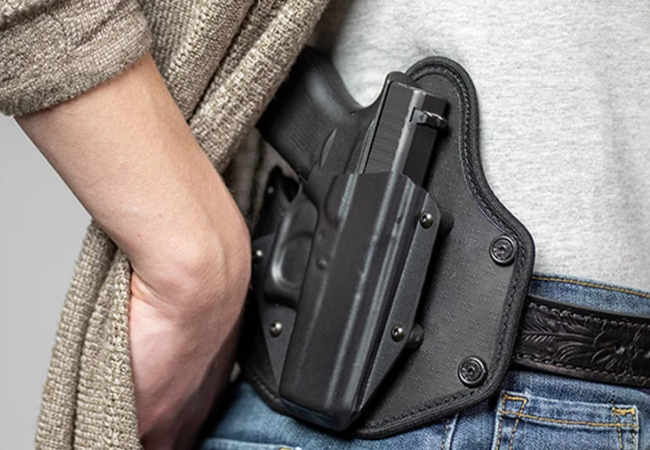
Risk of Unintentional Discharge
Carrying a weapon without a holster significantly increases the risk of unintentional discharge. The absence of a proper trigger guard and the shifting angle of the gun barrel due to body movements can easily lead to accidents.
A holster is designed to protect the trigger and keep the gun at a consistent angle, reducing the risk of an unintentional discharge that could lead to self-harm or endanger pedestrians.
Self-Harm and Public Safety
The angle at which you carry your firearm in a pocket or waistband can affect not only your safety but also that of those around you. Improper angles can make it easier for the weapon to be accidentally discharged.
Furthermore, without a holster, the firearm is more accessible to theft, posing another safety concern. Therefore, choosing to use a holster can be viewed as a measure to ensure both personal and public safety.
Financial Aspects
Beyond the legal and safety aspects, there are also financial considerations to take into account when deciding to carry without a holster.
Budget Considerations
While it may appear cost-effective to forgo a holster initially, the potential risks involved could lead to financial burdens down the line.
For example, unintentional discharge could result in legal fees or even a civil lawsuit. Fines for not adhering to state-specific concealed carry laws could also be costly. Therefore, what may seem like a budget-friendly choice can actually end up being expensive in the long run.
Value for Money in Handgun Holsters
Investing in a quality holster may seem like an additional expense but consider it a long-term investment in safety and legality.
High-quality holsters are designed to provide optimal trigger guard, secure weapon retention, and quick access when needed. So while you might be tempted to save money upfront, investing in a quality holster can provide you with peace of mind and legal protection, ultimately offering better value for money.
Carrying Options
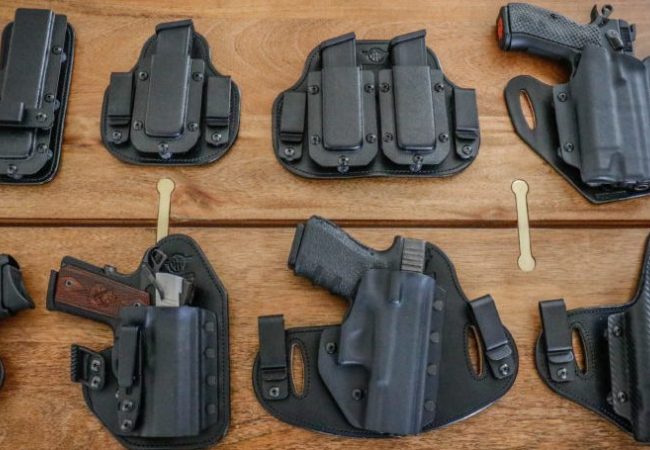
Pocket Carry
Slipping a pistol into your pocket might seem convenient, but it’s not always safe or legal.
Waistband Carry
Carrying a weapon in your waistband is a common practice, but it may not be the safest or most lawful option.
Bags and Fanny Packs
Some people use fanny packs or bags to carry their firearms, but these can pose their own sets of risks and legal issues.
Handbags and Purses
For those who prefer not to wear a belt, a handbag might seem like an option, but it comes with its own set of challenges.
Overview of Gun Laws by Nation
It’s also worth noting how concealed carry laws, including those related to holsters, vary not just by state but also globally.
FAQs
Do I have to have a holster for my gun?
The requirement for using a holster for your gun depends on the jurisdiction in which you’re carrying. While some states may not specifically mandate the use of a holster, carrying without one can introduce various legal risks and safety concerns, such as unintentional discharge. It is advisable to consult local laws and possibly seek legal advice to fully understand your obligations and limitations.
Do you have to use a holster?
Using a holster is generally recommended for safety reasons, even if not explicitly required by law. A holster is designed to protect the trigger, securely hold the firearm, and prevent unintentional discharge. Carrying a firearm without a holster can result in the weapon shifting positions, increasing the likelihood of accidental firing and posing risks to both yourself and others.
What is it called when you carry without a holster?
Carrying a firearm without a holster is often referred to as “Mexican Carry.” This term is used to describe carrying a handgun tucked into one’s waistband without a holster. This method is generally discouraged due to the safety risks and potential legal complications associated with carrying a firearm without a secure holding mechanism.
Can you carry a Glock without a holster?
Technically, it may be possible to carry a Glock without a holster, but it’s usually not recommended. Glocks are equipped with internal safeties but lack external manual safeties, making the risk of unintentional discharge higher when carried without a holster. A quality holster designed for Glocks will provide additional safety features like trigger guard protection, reducing the risk of accidental firing.
Conclusion
while it may be physically possible to carry a firearm without a holster, the practice is fraught with legal uncertainties and significant safety risks.
The absence of a holster increases the likelihood of unintentional discharge, poses risks to both the carrier and the public, and can complicate one’s legal standing.
Even if a holster is not explicitly mandated by law, its use is strongly advised to mitigate these risks.
Before choosing to carry a firearm—holstered or not—always make sure to consult the specific regulations in your jurisdiction and consider the potential consequences carefully.
Overall, the seemingly simple act of forgoing a holster can have far-reaching implications that should not be taken lightly.

